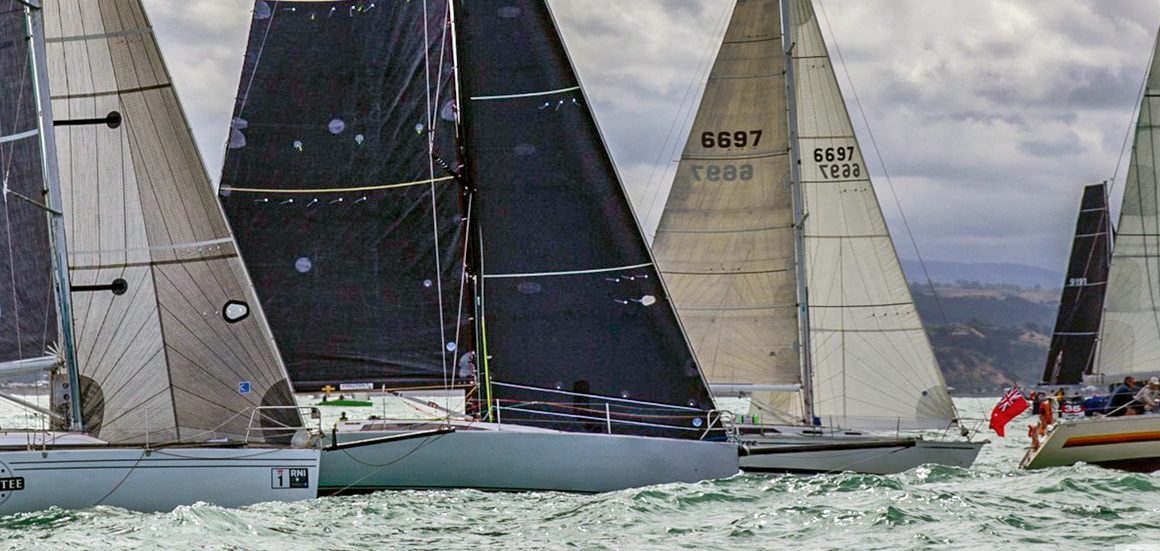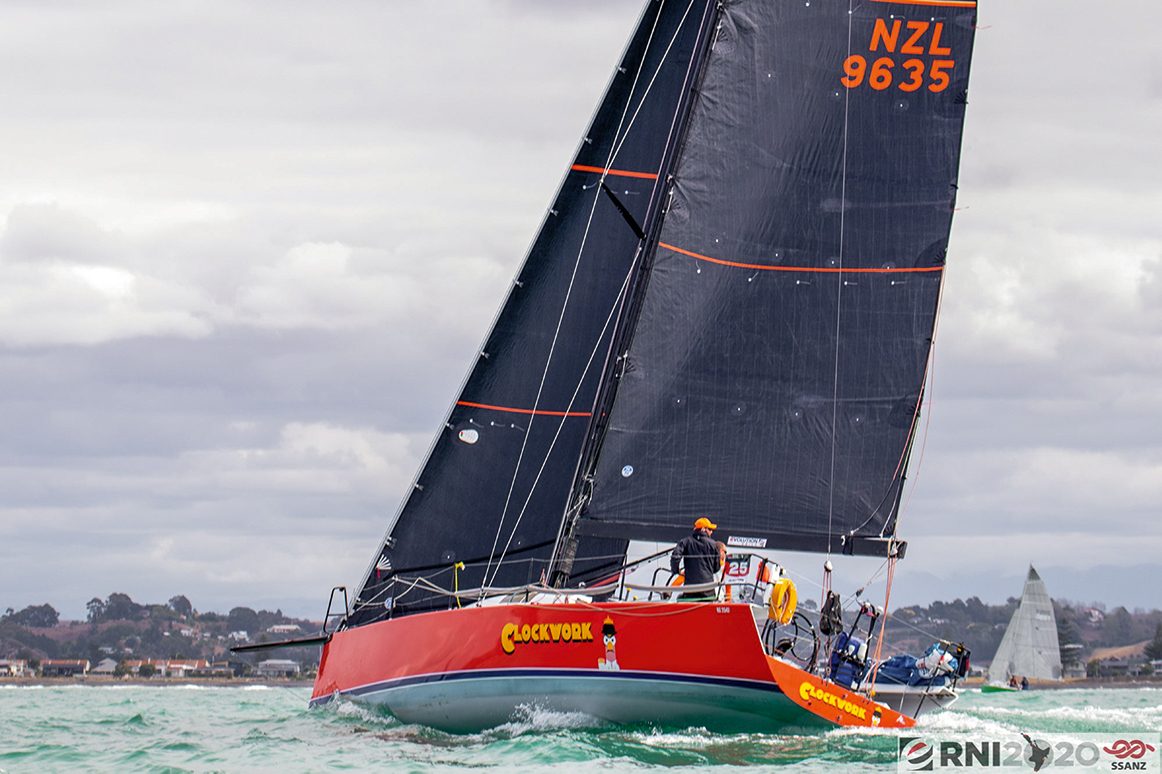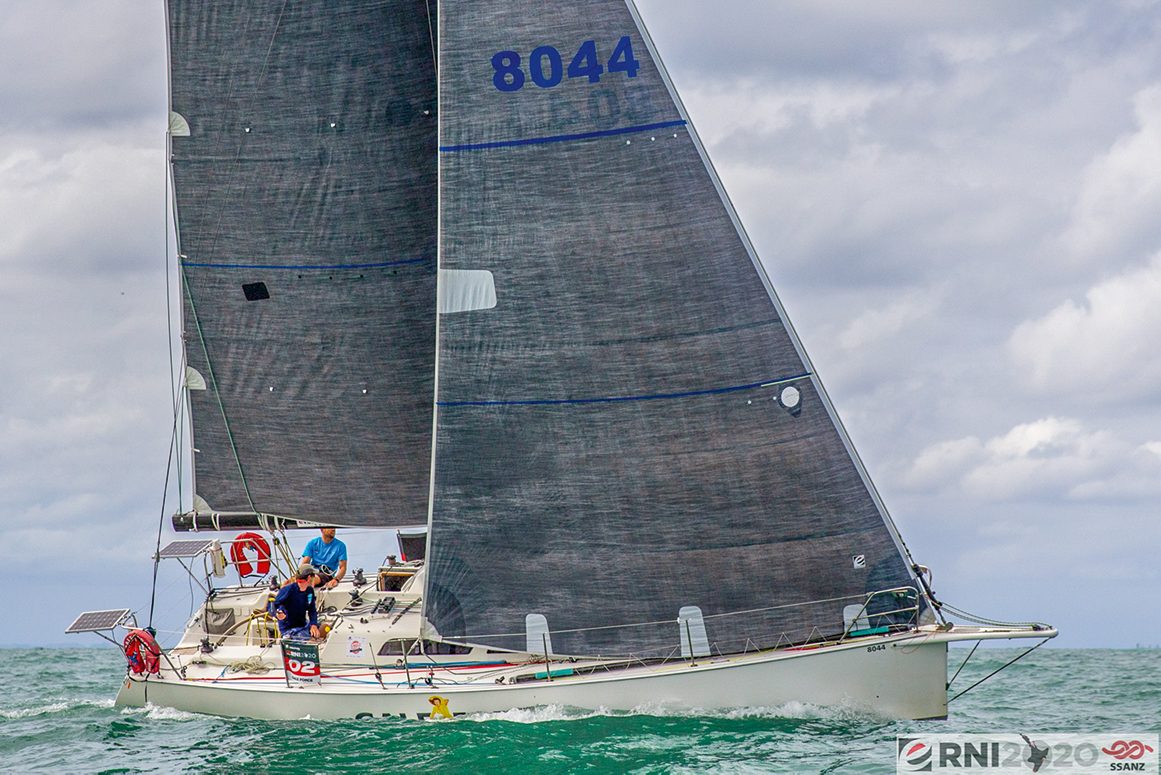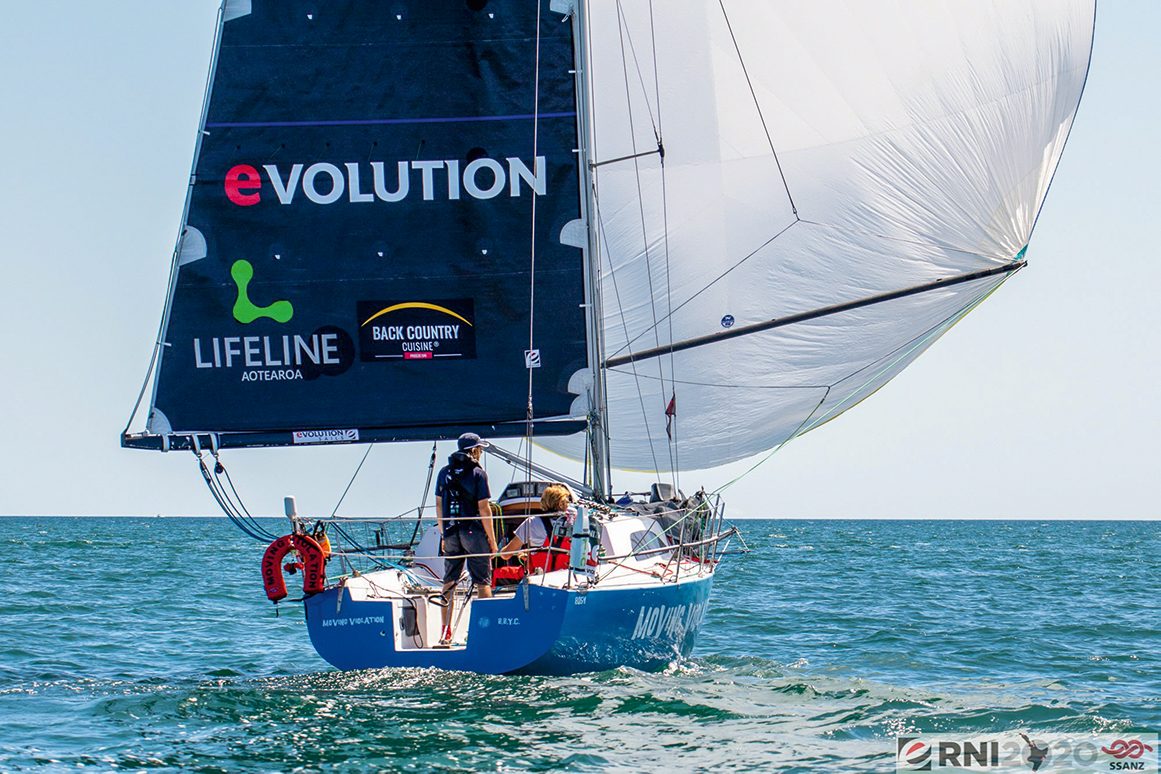

It’s one of New Zealand sailing’s biggest challenges but also one of its most popular events. Young and old, the experienced and the novice, friends and family pairings were all attracted to this year’s SSANZ Two-Handed Round North Island Race (RNI). Story by Sarah Ell.
A lot of preparation and a little bit of luck proved to be a winning formula for Auckland sailors Steve Mair and Jamie Logan, sailing the Bakewell-White 37 Clockwork. The yacht which began life as the General Lee in 2010 won both overall PHRF honours and division 2 in the challenging race, which this year saw 38 teams cover 1200 nautical miles in a range of conditions.
First over the line for each leg – and recording the fastest overall elapsed time (6 days 13 hours 11 minutes and 5 seconds) – was another Bakewell-White design, the 52-foot Wired, skippered by owner Rob Bassett and Angus Small. But this race is not all about winning; for some competitors just making it around the notoriously tough course is the goal.
Mair, the former commodore of the Royal New Zealand Yacht Squadron, always had the Round North Island race in his sights. His father Kerry did the race in 1982, when Mair was just six years old, and the RNI was one of his two main goals when he bought Clockwork in Perth and brought her back to New Zealand in 2017.

“The race came before the boat, really,” Mair says. “There were two things on my bucket list – Round North Island and an offshore campaign. We did the second one a couple of years ago, racing up to Noumea and doing the Groupama Race there, so Round North Island was the other big one.”
They say the harder you work, the luckier you get, and the Clockwork crew were able to make the most of their opportunities around the track. Mair admits that, as with all races like this, luck did come into play at times. Clockwork managed to avoid being trapped in a large hole off Taranaki and get into Wellington Harbour before strong winds arrived on leg two, and also made it to Napier in a good breeze before conditions lightened behind them.
“There’s a lot of luck and timing with this race – we had the rub of the green for sure, and we didn’t have anything break, which made it pretty easy for us,” Mair says.
On the final leg back to Auckland, an “average” start and a period of upwind to East Cape turned into a fast and furious reach across the Bay of Plenty, which saw them finish ahead of division 1 boat Anarchy.
“One of our goals was to pick off one of the three [division 1] 40-footers [Anarchy, Mr Kite and Blink] on one of the legs – we know we’re not as fast as them so that was our aim. We were pretty close to Mr Kite on that last leg too. It was an awesome way to finish.”
Winning division 3 on PHRF was one of the smaller boats in the race, the Thompson 850 Waka, sailed by owner Sam Cremer and Brett Elliott. The 8.5m boat had “a pretty massive birthday” before the event, with a new keel and deck gear, new sails, and the addition of water ballast to improve its performance. But perhaps the most significant thing about this campaign was that Cremer has only been sailing for three years.

“He had this goal in mind and he just took it on,” Elliott says. “He’d done the RNZYS’s learn-to-sail and learn-to-race programme, then crewed on a few boats before buying his own boat, and a boat like Waka isn’t super-easy to sail. I think that’s pretty cool – we need more people like him in the sport, who are prepared to fully get into it.”
After lots of upwind sailing earlier in the race, Waka also enjoyed a fast and fun downwind ride on the last stage to take out the leg and the division on overall PHRF.
“We probably surprised a lot of people with our performance,” Elliott says. “Leg three was mostly upwind and we managed to hang in there, after a good start and blasting along the coast to Cape Palliser downwind with the A2 on. But on the last leg we were really fast downwind and stuck to our plan of staying out in the breeze across the Bay of Plenty.”
Another less-experienced team who showed what they were made of – and won the respect of their competitors along the way – was Ben Beasley and Nick Gardiner aboard the Elliott 7.9 Moving Violation. Beasley is aged 19 and Gardiner 21, and their successful trip around the North Island not only saw them win division four on overall PHRF but also raise more than $9,000 for the Youthline charity.
“I was really amazed by how much we ended up with,” Gardiner says. “Originally we were thinking it would be good if we managed to get three thousand. But at the Wellington stopover alone we went round with the bucket and raised a thousand dollars at the prizegiving.”
After finding they were “not that far off the pace” on the first leg (Auckland to Mangonui) the boys took a flyer out to the west on the second leg down to Wellington, relying on their weather routing information to sail out and around an area of high pressure and light winds off the west coast.
“We took a bit of a gamble, but it was a safe gamble,” Gardiner says. “All our routing was telling us to do it, but we ended up sailing 670 miles instead of the 550 rhumb line miles – like doing anything for you. If you had a hard leg and came in late, people would come and give you a hand, and because there were lots of people competing who are involved in the industry, if you had issues they would come and help you. The camaraderie of it was really humbling.”

Another team to be on the receiving end of lots of support was the only all-female crew in the race, Christchurch team Victoria Murdoch and Emily Riley aboard the Elliott 1050 High Voltage. After months of preparation, Murdoch and Riley hit trouble – literally – on the first leg of the race.
“We hit something at 4am off Cape Brett – we’re still not sure whether it was a sunfish or a whale, as we’ve got scuff marks under the boat,” Murdoch says. “We thought we’d lost the rudder but it turned out we’d just lost steering, so we came into Opua and hauled out to have the boat checked over.”
With no major damage done, the team rejoined the race for leg two, but problems continued. After making it down the west coast, they discovered one of the propeller blades had fallen off, but thanks to the team on Wellington-based Shaw 9 Blink, who had a suitable spare, the prop was replaced in time for the boat to start leg three.
“We just had so much support behind us, with other crews lending us gear and helping out to help to get us there,” Murdoch says.
After a frustrating leg three – stuck in a hole by Cape Palliser then a strong southerly chasing them into Napier – the last leg saw them encounter more problems, with the plate between the rudder and tiller cracking (probably also as a result of the earlier collision), and the team having to nurse the boat back to Auckland.
“We’re pretty proud of what we achieved,” Murdoch says. “We went into the race not knowing what to expect, and although the results don’t show it, I feel we learned absolute truckloads in terms of not only sailing but also about our personal limits. I’ve never been so tired, but I also know that I have the endurance and stamina to work through challenges, and when things did go wrong we worked really well as a team to get it sorted. It really is a race like no other.”




